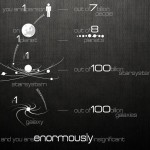 I’ve always loved watching and listening to Neil deGrasse Tyson, even before he hosted Carl Sagan’s creation, Cosmos. Almost every time I listen to Dr. Tyson, he makes me think about what we “know” (in our Knower/Judger sort of way) to be “right,” and how potentially naïve that knowledge is.
I’ve always loved watching and listening to Neil deGrasse Tyson, even before he hosted Carl Sagan’s creation, Cosmos. Almost every time I listen to Dr. Tyson, he makes me think about what we “know” (in our Knower/Judger sort of way) to be “right,” and how potentially naïve that knowledge is.
We often define ourselves by the truths we subscribe to—I know, therefore I am. So, faced with the reality that the sum of what we actually know is vanishingly small, how do we make sense of our place in the bigger picture?
Ask yourself the question “What do I know?” You could discourse for days on all the wisdom you possess. You could wax intelligent on subjects from baseball to ballistics, geography to gambling. But when you’re done, ask yourself the question “What don’t I know?” You could spend the rest of your life answering that one—and not even scratch the surface.
And it’s not just you. Scientific fact has been serially temporarily “right” for all of human history.
Earth is flat…scientific fact.
Pluto is a planet…scientific fact.
The atom is the smallest particle…scientific fact.
It seems that as soon as science (whoever that is or whoever’s funding it) makes a statement of “fact,” the unraveling of that fact begins. Sometimes it takes centuries, sometimes mere weeks.
Really, when you look at the minuscule corner we occupy in space and time—as individuals or even as a species—is it any surprise that our perspective is limited?
Consider that there are more people walking this planet today than have ever lived and died in human history, a staggering upturn in population on the spaceship Earth. We’re one of 8.7 million species on this planet, which in turn is one of a small solar system of eight planets (remember, Pluto got booted). There are 30 billion planets in our galaxy. And there are 100 billion galaxies. So we’re a small portion of life on a speck of dust in the middle of hugeness.
In terms of time, we know from geology that this speck has been in existence for about 4.5 billion years. Homo sapiens (humankind) has been on the speck for about 200,000 years. That’s just the last four-thousandths of 1% of the lifespan of this planet.
So how can you or I feel so smug as to think we know…really know…anything?
My take is that we’re on a journey. Geology tells us that lots of species come and go; Nature’s been making critters and letting them die off for millions of years. And human civilizations have been coming and going for all of our 200,000 years. In most cases, we can’t even figure out why civilizations failed. The Aztecs? Poof! The Anasazi compounds and the cliff dweller lodges around the Four Corners area of our own country? Mysteriously gone, and they were around only 700 years ago! The Romans? Well, OK…the fall of Rome’s a little better documented.
Bottom line?
There’s too much uncertainty for me to get my ego wrapped up in being right about anything. Everything I think I know is suspect. Could be bad data. Could be bad interpretation of good data. Could be opinion with no data.
So what am I left with?
I’m incredibly grateful for where I live, in the time I live, understanding that it’s all a very, very small part of a really, really big picture. I get to play here, for one brief lifetime. And what I do with this lifetime has virtually no significance to anything other than me and to the people I choose to love and live with. To me, that’s the significance of my insignificance.
And that guy who cut me off on the I-270? He just isn’t that important in the scheme of things…and anyhow, I’m probably not “right” about how that went down, either.




